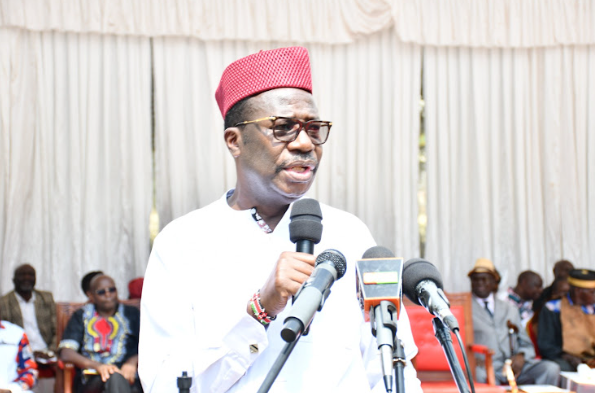The Judiciary has launched Alternative Justice Systems (AJS) County Action Plans and Suites in Trans Nzoia County. This initiative aims to address the significant justice gap of approximately 17 percent, primarily consisting of individuals who do not seek justice at all.
During the launch, Supreme Court Judge and Director of the Kenya Judiciary Academy (KJA), Smokin Wanjala, highlighted that three AJS Suites (Ukumbi) have been established in Kitale, Kiminini, and Cherangany to enhance access to justice for all Kenyans.
He emphasized that the AJS Ukumbi will not only serve as a physical space but also symbolize hope, autonomy, and empowerment for the people of Trans Nzoia.
“These Suites are a tangible representation of our dedication to entrenching a justice system that is independent, efficient, and responsive to the aspirations of all Kenyans,” Justice Wanjala said.
The Judge acknowledged that the conventional judicial processes, while essential, often face challenges such as high costs and lengthy procedures, which can be barriers to accessing justice.
“AJS offers a cost-effective and speedy resolution to disputes, ensuring that justice is not only done but seen to be done promptly and fairly,” he noted.
Justice Wanjala reiterated the role of the County Government in supporting Justice systems through devolution noting that the County Action Plan will be cascaded throughout the region and will be a driving force in AJS uptake and implementation.
“The Trans Nzoia Model demonstrates the great interface between different justice actors including the Court, the NGAO and the AJS Practitioners who are the elder,” the Judge said.
The Supreme Judge said that there had been engagement with judges of the Supreme Court, Court of Appeal, High Court and Courts of equal status training them on AJS, the need to change their mindset towards it, and the Constitutional mandate to respect, protect and transform the AJS initiatives.
“In particular, these engagements have proved critical in documenting and assessing the progress made to foster access to justice through entrenching a multi-door people centered justice; and giving tangible momentum to the AJS movement; suitably termed ‘Vuguvugu la AJS,” Justice Wanjala said.
Justice Wanjala stated that the multi-door approach to justice encompassed in Social Transformation through Access to Justice (STAJ) encourages the use of AJS as the first port call in instances where it is most suited to resolve a wide array of disputes.
“By recognising and promoting the alternative justice mechanisms mostly used by Kenyans, this commitment has brought significant changes for citizens’ access to justice, and justice seekers have benefitted from meaningful home-grown solutions befitting the Kenyan context; demonstrated by the success stories in Isiolo, Mandera, Kitui, Kajiado, Narok and Nakuru,” he said.
Speaking during the launch, Trans Nzoia County Governor George Natembeya noted that while the Court systems have their merit, they often fall short in addressing the root causes of crime and achieving true rehabilitation.
“This is why it became necessary to come up with alternative justice systems that provide a framework that focuses on healing, restitution and reintegration of offenders into the community,” he said.
He said the elders stand as the custodians of the communities’ traditions and values and their role will not only be to guide and advise but to also bridge the gap between past wisdom and present challenges.
“Your insights into our traditional justice practices are invaluable as we explore how these practices complement our modern legal systems. By this integration, we have an opportunity to create a more inclusive and effective justice system,” the Governor said.
Justice Joel Ngugi who is the Chair of the National Steering Committee on AJS said that the launch was a culmination of a most organic and invigorating socio-legal journey of truly returning the justice narrative to the people of Trans Nzoia.
“We are announcing today that communities can and must use AJS as the vehicle through which they can have important conversations about their societal issues of distribution of resources and power; and how they choose to frame their collective social preferences into public policies,” Justice Ngugi said.



